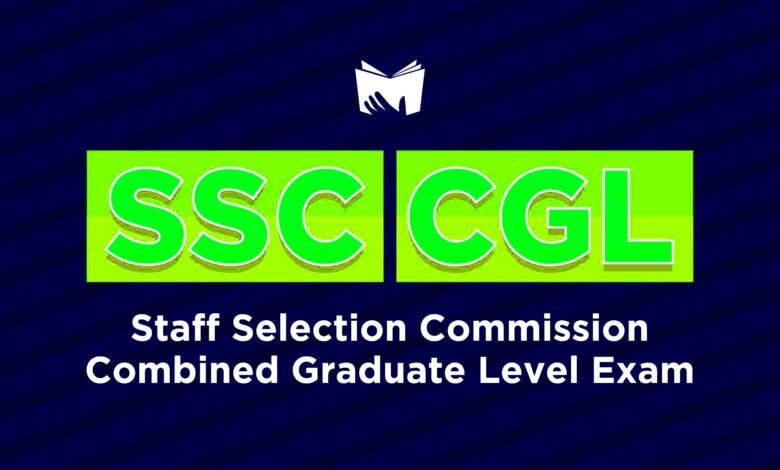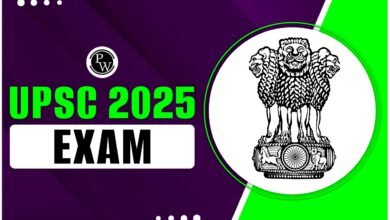Most Scoring Subjects in SSC CGL – Focus Smart, Not Hard
This article explores these high-scoring areas, providing detailed insights and practical tips to help you prepare for scoring subjects in SSC CGL exam.

The Staff Selection Commission Combined Graduate Level (SSC CGL) exam is one of India’s most sought-after competitive exams, offering candidates a gateway to prestigious government jobs. With lakhs of aspirants competing for limited vacancies, cracking the SSC CGL requires a strategic approach. Instead of spreading your efforts thin across all subjects, focusing on the most scoring subjects in SSC CGL can significantly boost your chances of success. This article explores these high-scoring areas, providing detailed insights and practical tips to help you prepare smartly and efficiently for the 2025 SSC CGL exam.
By prioritizing the scoring subjects in SSC CGL, you can maximize your marks with minimal effort, ensuring you stay ahead of the competition. Let’s dive into the key subjects, their weightage, preparation strategies, and why they are considered high-scoring.
Understanding the SSC CGL Exam Structure
Before delving into the scoring subjects in SSC CGL, it’s essential to understand the exam’s structure. The SSC CGL is conducted in four tiers:
- Tier 1: A computer-based objective test (60 minutes, 200 marks) covering General Intelligence and Reasoning, General Awareness, Quantitative Aptitude, and English Comprehension.
- Tier 2: Another computer-based objective test with papers like Quantitative Abilities, English Language and Comprehension, Statistics (for specific posts), and General Studies (Finance and Economics for specific posts).
- Tier 3: A descriptive paper (pen-and-paper mode) testing essay, letter, or precis writing.
- Tier 4: A skill test or document verification, depending on the post.
The scoring subjects in SSC CGL primarily lie in Tier 1 and Tier 2, as these are objective tests with significant weightage in the final merit list. Let’s explore the subjects that offer the highest return on your preparation investment.
Why Focus on Scoring Subjects in SSC CGL?
The SSC CGL syllabus is vast, and preparing for every topic equally can be overwhelming. By concentrating on the scoring subjects in SSC CGL, you can:
- Maximize Marks: These subjects have a high weightage and are relatively easier to master.
- Save Time: Focusing on high-scoring areas allows you to allocate time efficiently.
- Boost Confidence: Scoring well in these subjects builds momentum for tougher sections.
- Stay Competitive: High scores in these areas help you clear cut-offs and secure a top rank.
Now, let’s break down the most scoring subjects in SSC CGL and how to approach them effectively.
1. Quantitative Aptitude: The King of Scoring Subjects in SSC CGL
Quantitative Aptitude is undeniably one of the most scoring subjects in SSC CGL, appearing in both Tier 1 (25 questions, 50 marks) and Tier 2 (100 questions, 200 marks). With proper preparation, you can score 80–90% in this section, making it a game-changer.
Why Is Quantitative Aptitude a Scoring Subject?
- Predictable Syllabus: Topics like arithmetic, algebra, geometry, trigonometry, and data interpretation are well-defined.
- High Weightage: It constitutes 25% of Tier 1 and 50% of Tier 2 (Paper 1).
- Practice-Driven: Regular practice improves speed and accuracy, leading to high scores.
- Objective Nature: Questions have definitive answers, reducing ambiguity.
Key Topics to Focus On
To excel in Quantitative Aptitude, prioritize these high-scoring topics:
- Arithmetic (40–50% weightage): Simplification, percentage, profit and loss, time and work, time and distance, ratio and proportion, and simple/compound interest.
- Data Interpretation (10–15% weightage): Bar graphs, pie charts, tables, and line graphs.
- Geometry (15–20% weightage): Triangles, circles, polygons, and coordinate geometry.
- Algebra (10–15% weightage): Linear equations, quadratic equations, and polynomials.
- Trigonometry (5–10% weightage): Heights and distances, trigonometric ratios, and identities.
- Number System (5–10% weightage): LCM, HCF, divisibility, and remainders.
Preparation Strategy
- Master Basics: Strengthen your foundation by revising NCERT textbooks (Class 8–10) for concepts like fractions, percentages, and geometry.
- Learn Shortcuts: Use tricks for quick calculations, such as Vedic Maths for multiplication or percentage-to-fraction conversions.
- Practice Daily: Solve 50–100 questions daily, focusing on speed and accuracy. Platforms like Testbook and Gradeup offer excellent mock tests.
- Analyze Mock Tests: Identify weak areas and work on them. Aim to solve Tier 1 Quant in 15–20 minutes and Tier 2 in 60–70 minutes.
- Use Quality Resources: Books like Quantitative Aptitude by R.S. Aggarwal and Fast Track Objective Arithmetic by Rajesh Verma are highly recommended.
Pro Tip
Focus on accuracy over guesswork, as negative marking (-0.5 in Tier 1, -0.25 in Tier 2) can hurt your score. By mastering Quantitative Aptitude, you solidify your position in the scoring subjects in SSC CGL.
2. English Language and Comprehension: A High-Scoring Gem
English Language and Comprehension is another scoring subject in SSC CGL, featuring prominently in Tier 1 (25 questions, 50 marks) and Tier 2 (200 questions, 200 marks). For candidates with decent language skills, this section offers an opportunity to score 85–95%.
Why Is English a Scoring Subject?
- Less Time-Consuming: Questions like vocabulary, grammar, and comprehension can be solved quickly.
- High Accuracy: With strong fundamentals, you can minimize errors.
- Repetitive Question Types: Topics like cloze tests, error spotting, and synonyms/antonyms follow predictable patterns.
- No Complex Calculations: Unlike Quant, English relies on knowledge and intuition.
Key Topics to Focus On
- Vocabulary (20–25% weightage): Synonyms, antonyms, one-word substitutions, idioms, and phrases.
- Grammar (20–25% weightage): Error spotting, sentence improvement, active/passive voice, and direct/indirect speech.
- Reading Comprehension (15–20% weightage): Passages with 4–5 questions each.
- Cloze Test (10–15% weightage): Fill-in-the-blank passages testing contextual understanding.
- Sentence Rearrangement (5–10% weightage): Jumbled sentences to be arranged logically.
- Spelling and Word Usage (5–10% weightage): Common spelling errors and word meanings.
Preparation Strategy
- Build Vocabulary: Read newspapers like The Hindu or Indian Express daily and note 10–15 new words with their meanings. Apps like Word Power or Quizlet can help.
- Master Grammar: Study rules from Wren & Martin High School English Grammar or Objective General English by S.P. Bakshi. Practice error-spotting questions daily.
- Practice Comprehension: Solve 2–3 passages daily to improve reading speed and accuracy. Focus on skimming techniques to save time.
- Take Mock Tests: Simulate exam conditions to improve time management. Aim to solve Tier 1 English in 10–12 minutes and Tier 2 in 50–60 minutes.
- Revise Idioms and Phrases: Maintain a notebook for common idioms, phrases, and one-word substitutions asked in previous years.
Pro Tip
For Tier 2, practice long passages and complex sentence structures, as the difficulty level is higher. English remains a cornerstone among the scoring subjects in SSC CGL due to its predictability and high accuracy potential.
3. General Intelligence and Reasoning: The Easy Scorer
General Intelligence and Reasoning is a scoring subject in SSC CGL exclusive to Tier 1 (25 questions, 50 marks). With the right approach, you can score 40–45 marks in this section, making it a low-effort, high-reward area.
Why Is Reasoning a Scoring Subject?
- No Complex Formulas: Unlike Quant, reasoning relies on logic and pattern recognition.
- Quick to Solve: Many questions can be solved in 10–15 seconds with practice.
- High Accuracy: Logical questions have clear answers, reducing guesswork.
- Consistent Patterns: Topics like analogy, series, and puzzles follow repetitive formats.
Key Topics to Focus On
- Analogy and Classification (15–20% weightage): Word, number, and figure-based analogies.
- Series (15–20% weightage): Number, alphabet, and mixed series.
- Coding-Decoding (10–15% weightage): Letter shifting, number coding, and symbol-based coding.
- Puzzles and Seating Arrangement (10–15% weightage): Linear, circular, and tabular arrangements.
- Non-Verbal Reasoning (10–15% weightage): Mirror images, water images, and figure completion.
- Syllogism and Venn Diagrams (5–10% weightage): Logical deductions and set theory.
- Blood Relations and Direction Sense (5–10% weightage): Family trees and navigation-based questions.
Preparation Strategy
- Understand Question Types: Familiarize yourself with common patterns using books like A Modern Approach to Verbal & Non-Verbal Reasoning by R.S. Aggarwal.
- Practice Daily: Solve 50 reasoning questions daily, focusing on speed and accuracy.
- Use Visual Aids: For non-verbal reasoning, practice with diagrams and flowcharts to improve visualization.
- Learn Shortcuts: Master techniques like reverse coding for coding-decoding or elimination methods for syllogism.
- Take Mock Tests: Aim to solve the reasoning section in 12–15 minutes during practice.
Pro Tip
Avoid spending too much time on puzzles or seating arrangements. If a question seems complex, skip it and return later. Reasoning’s simplicity makes it one of the scoring subjects in SSC CGL.
4. General Awareness: The Time-Saver
General Awareness (GA) is a scoring subject in SSC CGL in Tier 1 (25 questions, 50 marks). While it can be challenging due to its vast syllabus, strategic preparation can help you score 35–40 marks in minimal time.
Why Is General Awareness a Scoring Subject?
- No Calculations: Questions are knowledge-based, requiring no problem-solving.
- Time-Efficient: Each question takes 5–10 seconds if you know the answer.
- High Accuracy: Correct answers are definitive, minimizing negative marking.
- Static Portion Dominates: Topics like history, geography, and polity are predictable.
Key Topics to Focus On
- Static GK (50–60% weightage): History (ancient, medieval, modern), geography (physical, Indian, world), polity (Constitution, amendments, articles), economics (basic concepts, budgets), and science (physics, chemistry, biology).
- Current Affairs (20–30% weightage): Last 6–12 months’ news, government schemes, sports, awards, and international events.
- Miscellaneous (10–20% weightage): Books and authors, important dates, and national parks.
Preparation Strategy
- Read Standard Sources: Use Lucent’s General Knowledge or Manorama Yearbook for static GK. Follow monthly current affairs magazines like Pratiyogita Darpan.
- Stay Updated: Read newspapers daily and use apps like BYJU’S Exam Prep for curated current affairs.
- Revise Regularly: Create concise notes for quick revision. Use flashcards for facts like capitals, presidents, or scientific inventions.
- Practice Quizzes: Solve 50–100 GA questions daily from platforms like Adda247 or Oliveboard.
- Focus on High-Yield Areas: Prioritize polity, modern history, and biology, as they have higher weightage.
Pro Tip
In GA, guesswork is risky due to negative marking. Attempt only those questions you’re confident about. GA’s time-saving nature makes it a critical scoring subject in SSC CGL.
Time Management: The Key to Mastering Scoring Subjects in SSC CGL
To leverage the scoring subjects in SSC CGL, effective time management is crucial. Here’s how to allocate time during the exam:
- Tier 1 (60 minutes):
- Quantitative Aptitude: 15–20 minutes
- English: 10–12 minutes
- Reasoning: 12–15 minutes
- General Awareness: 8–10 minutes
- Tier 2 (Paper 1 – Quant, 120 minutes): Aim to solve 80–90 questions in 60–70 minutes, leaving time for revision.
- Tier 2 (Paper 2 – English, 120 minutes): Solve 150–170 questions in 50–60 minutes, focusing on accuracy.
Practice mock tests to fine-tune your timing and prioritize the scoring subjects in SSC CGL during preparation and the exam.
Common Mistakes to Avoid
While focusing on the scoring subjects in SSC CGL, avoid these pitfalls:
- Ignoring Basics: Skipping fundamentals in Quant or English can lead to errors.
- Over-Reliance on Guesswork: Negative marking can lower your score, especially in GA.
- Neglecting Mock Tests: Without practice, you won’t master time management.
- Unbalanced Preparation: Don’t ignore other subjects entirely; aim for a balanced score.
- Lack of Revision: Failing to revise GA or vocabulary can hurt your performance.
Recommended Resources for Scoring Subjects in SSC CGL
To excel in the scoring subjects in SSC CGL, use these trusted resources:
- Quantitative Aptitude: Quantitative Aptitude by R.S. Aggarwal, Fast Track Objective Arithmetic by Rajesh Verma, Kiran’s SSC Mathematics.
- English: Objective General English by S.P. Bakshi, Wren & Martin High School English Grammar, Plinth to Paramount by Neetu Singh.
- Reasoning: A Modern Approach to Verbal & Non-Verbal Reasoning by R.S. Aggarwal, Analytical Reasoning by M.K. Pandey.
- General Awareness: Lucent’s General Knowledge, Manorama Yearbook, monthly current affairs from Pratiyogita Darpan.
- Online Platforms: Testbook, Adda247, Gradeup, Oliveboard for mock tests and quizzes.
Conclusion: Work Smart with Scoring Subjects in SSC CGL
Cracking the SSC CGL 2025 exam requires a strategic approach, and focusing on the most scoring subjects in SSC CGL—Quantitative Aptitude, English Language, General Intelligence and Reasoning, and General Awareness—can give you a competitive edge. By mastering these areas, you can maximize your score, save time, and boost your confidence. Combine consistent practice, quality resources, and effective time management to turn these scoring subjects in SSC CGL into your strengths.
Start your preparation today, prioritize the scoring subjects in SSC CGL, and work smart, not hard, to secure your dream government job. Good luck.











